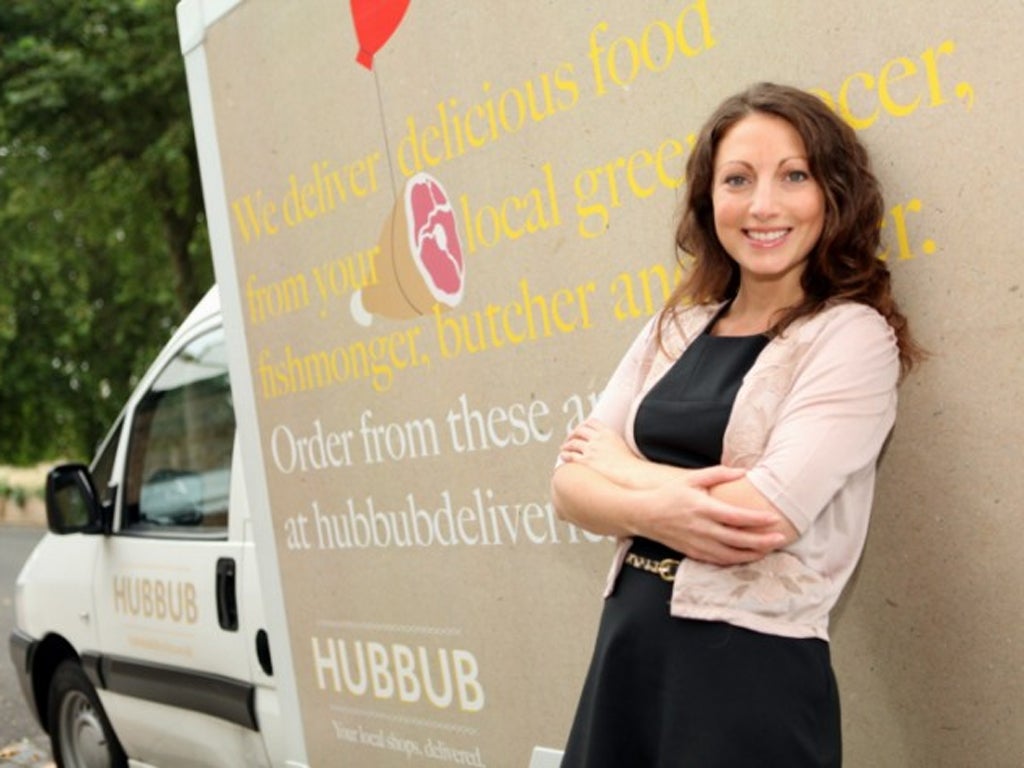Local food that's just a click away: How to shop online without filling supermarkets' pockets

When Marisa Leaf was working as a human rights barrister she found herself, by day, fighting for things she passionately believed in. But the long hours she worked – often leaving chambers at 10 or 11 at night – meant that she had no time to make the principled decisions she wanted to in her own life.
"Because of the hours I worked I was unable to make ethical choices about where I spent my own money," she says. "I was stuck doing my food shop online from a large supermarket, which was something I really didn't want to do. I disliked the quality of the food and I wanted to be able to support my local independent retailers, but it wasn't an option for me."
Leaf, now 33, had always wanted to start her own business and so, the germ of an idea was born. Her plan was to create a home delivery service using local independent shops – so if you don't have time to visit the butcher, the baker and the fishmonger, someone else can do it for you. Leaf spent a year talking to shops and researching her idea. Finally, at the tail end of 2008 she was ready. She jacked in her job, and with Godfrey's butcher shop in Islington and the cheese shop La Fromagerie, on her books, she started a pilot.
"It was me doing deliveries in my then boyfriend, now husband's, Mini," says Leaf. "I couldn't even drive prior, so had to quickly learn in a 10-day crash course. It was absolutely terrifying. We planned to do a six-week trial and stop just before the Christmas rush, but we did so well we just carried on."
Hubbub, as it is now called, launched properly last January, and now has thousands of customers. "Numbers have nearly quadrupled in the past 12 months," she says, and Hubbub now uses more than a dozen shops and six delivery vans (bright yellow ones – watch as they crop up everywhere soon). Currently it just serves an area of London which stretches from Kentish Town, via Islington and Hackney to the City, but the plan is to roll it out across the whole of the capital early this year and following that, the rest of the UK.
What is so clever about Leaf's idea is that if you log on in, say, north or west London, you will be only be served by the shops in your immediate vicinity, so you will be directly supporting your local businesses. Also, unlike, the organic vegetable box schemes, which just dump boxes on your doorstep, Hubbub, has taken a tip from our online supermarkets so you can book in for timed hourly delivery slots (£3.50, or free for orders over £75). And if you place your order before midday, the delivery can be at your door in time for supper that same night.
"The whole thing does rely on a certain type of local shopkeeper," says Leaf, "The quality has to be impeccable and because they have a two-hour slot after the midday bookings to prepare the orders, their timing has to be impeccable." There are drawbacks to the scheme, the most obvious of which is price. A quick comparison with Sainsbury's, for example, shows that four Cox's apples would cost £1.24 and at Hubbub they would be £1.52. While six large, organic free-range eggs at Sainsbury's are £1.98 and at Hubbub they are £2.05.
But given that quality of local specialist shops is always going to be much higher, these prices seem reasonable. Leaf also includes thrift sections on the site. In the meat department, for instance, 100g of beef mince from the high-end butchers Ginger Pig costs 85p, while at Sainsbury's it works out to be 70p, which may be a bit cheaper, but I know which I'd rather eat.
"I would much rather have meat less often or eat a less fancy cut if I could make sure I was still getting the quality and supporting good farming practices," says Leaf. Plus, it all seems like a small price to pay to help keep your high street alive.
I ask whether she has plans to invite, say, the local Londis in to her repertoire of shops, so as well as stocking up on delicious breads, cheeses and meats, you could buy staples such as loo roll and tins of beans. "We do sell some household products such as bin bags and loo roll – I think it's important to be able to offer that – but we are never going to be able to compete on price with a supermarket," she says.
"What most of our customers do is buy all that stuff in bulk from somewhere like Ocado every six-eight weeks and then get fresh stuff from Hubbub weekly. It is something we are keeping an eye on, but it's not something I'm convinced we should do."
As Hubbub gears up to go nationwide next year, Leaf is asking people from all over the UK to register their postcode on the site and nominate their favourite local shops. Once each area gets enough interest, the Hubbub team will roll the service out. "We've already had an immeasurable impact on the shops we work with – we are talking tens of thousands of pounds of revenue. That's not to be sniffed at," says Leaf.
"I think Hubbub really has the potential to make a real difference. In five years' time the plan is to be all over the UK giving Tesco a run for its money."
Join our commenting forum
Join thought-provoking conversations, follow other Independent readers and see their replies
0Comments